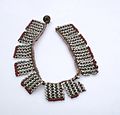Zulu people facts for kids
| Total population | |
|---|---|
| ~ 12,159,000 | |
| Regions with significant populations | |
| 10,659,309 (2001 census) to 12,559,000 |
|
| 324,000 | |
| 167,000 | |
| 107,000 | |
| 66,000 | |
| 5,900 | |
| 6,000 | |
| Languages | |
| Zulu (many also speak English, Portuguese, Afrikaans and Xhosa) |
|
| Religion | |
| Christianity, Zulu religion | |
| Related ethnic groups | |
| Nguni, Xhosa, Swazi, Ndebele, other Bantu peoples | |
The Zulu people are the biggest ethnic group in South Africa. About 10 to 11 million Zulu people live there, mostly in the KwaZulu-Natal province. Some Zulu also live in nearby countries like Zimbabwe, Zambia, and Mozambique. Their language is called isiZulu. It is a Bantu language from the Nguni group.
The Zulu Kingdom was very important in South African history. This was especially true during the 1800s and 1900s. During a time called Apartheid, Zulu people faced unfair treatment. They were seen as second-class citizens. Today, the Zulu are the largest group in South Africa. They now have equal rights like everyone else.
Contents
Where Did the Zulu People Come From?
The Zulu were first a major clan in what is now Northern KwaZulu-Natal. A clan is like a large family group. The Zulu clan started around the year 1709. It was founded by a person named Zulu kaNtombhela.
In the Nguni languages, the words iZulu, iliZulu, and liTulu mean heaven or sky.
Early Communities and Migrations
In the early 1700s, many large Nguni communities lived in the area. These groups were called isizwe (nations) and isibongo (clans). These Nguni communities had migrated along the East coast of Africa. This movement happened over thousands of years.
These big movements of people were part of the Bantu migrations. The Nguni people likely arrived in what is now South Africa in the 800s.
Related Pages
Images for kids
-
Shaka, king of the Zulu.
-
Zulu warriors in the late nineteenth century, with Europeans in the background.
See also
 In Spanish: Pueblo zulú para niños
In Spanish: Pueblo zulú para niños
 | James Van Der Zee |
 | Alma Thomas |
 | Ellis Wilson |
 | Margaret Taylor-Burroughs |










